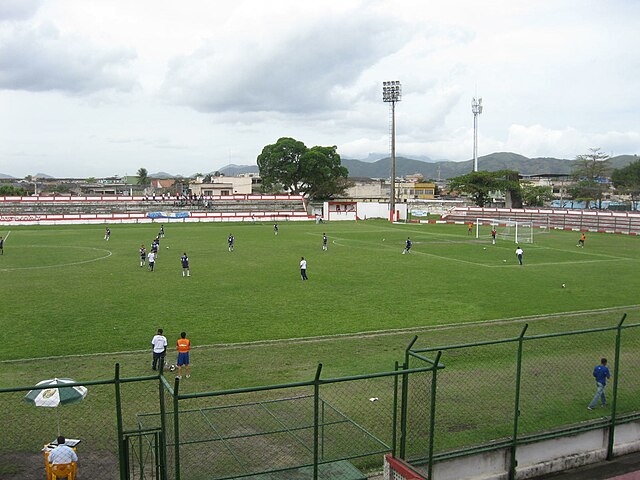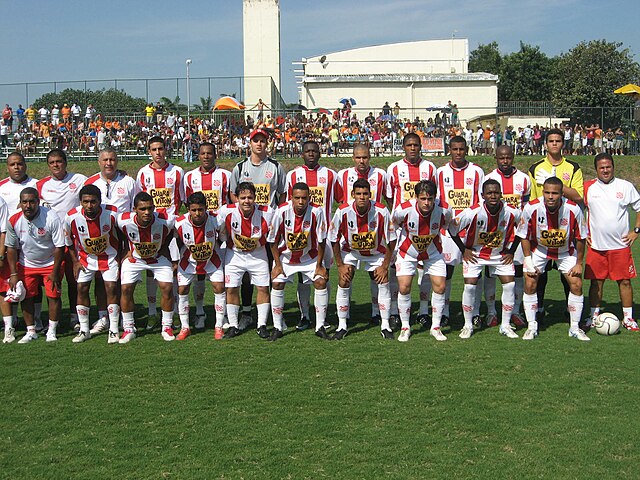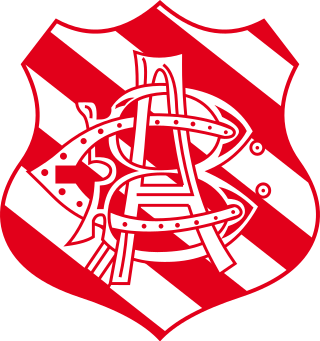Top Qs
Timeline
Chat
Perspective
Bangu Atlético Clube
Football club From Wikipedia, the free encyclopedia
Remove ads
Bangu Atlético Clube, commonly known as Bangu, is a Brazilian professional association football club based in Rio de Janeiro, in the western neighbourhood of Bangu. The team plays in Série D, the fourth tier of the Brazilian football league system, as well as in the Campeonato Carioca, the top tier of the Rio de Janeiro state football league.





The club competed in the Campeonato Brasileiro Série A several times, finishing as runner-up in 1985. Their home stadium is the Estadio Moça Bonita, which has a capacity of 15,000.
Remove ads
History
Summarize
Perspective
The club has its origins in Fábrica Bangu (Bangu Factory), located in Bangu neighborhood, Rio de Janeiro.[1] Some Britons that worked at the factory, especially Thomas Donohoe, introduced football to the factory workers by bringing footballs to the place and organizing the first football match in Brazil.[1] In December 1903, Andrew Procter suggested the foundation of a club, when he realized how enthusiastic his colleagues were for football.[1] The club was founded on April 17, 1904 as Bangu Atlético Clube.[1] Bangu was the first football club in Brazil to feature black and mulatto players.[citation needed]
In 1933, Bangu won its first state championship.[2]
In 1966, Bangu won its second state championship in a game played in the world's largest stadium filled with over 120,000 fans, the Maracana. They beat powerhouse Flamengo 3–0 in a game remembered by a big brawl caused by Flamengo's players, in which several players got ejected afterwards.[2] In 1967, Bangu, as the Houston Stars, represented the city of Houston in the United Soccer Association.[3] The club finished with four victories, four draws and four defeats, but led the competition's attendance, with an average of 19,000 supporters per match.[4]
In 1985, Bangu was the runner-up of Campeonato Brasileiro, gaining the right to compete in the following year's Copa Libertadores.[5]
In 2004, Bangu was relegated to the Campeonato Carioca Second Level,[6] returning to the first level in 2009, after winning the 2008 second level.[7]
Remove ads
Honours
Summarize
Perspective
Official tournaments
Others tournaments
International
- Ecuador International Triangular Tournament (1): 1957
- Caracas Triangular Trophy (1): 1958
- Luxembourg International Triangular Tournament (1): 1958
- Costa Rica International Quadrangular Tournament (1): 1959
- International Soccer League (1): 1960
- International Triangular Tournament of Austria (1): 1961
- International Quadrangular Tournament of Ecuador (1): 1962
- President's Cup (Korea) (1): 1984
- El Salvador International Quadrangular Tournament (1): 1998
- Winter Tournament (1): 1999
- BTV Cup (1): 2015
National
- Torneio Imprensa (1): 1943
- Torneio Quadrangular do Rio de Janeiro (1): 1957
- Torneio Triangular de Porto Alegre (1): 1957
- Torneio Quadrangular do Recife (1): 1961
- Torneio Quadrangular de Belém do Pará (1): 1962
- Copa dos Campeões (1): 1967
- Torneio de Campinas (1): 1968
Inter-state
- Torneio Início do Rio-São Paulo (1): 1951
State
- Taça Rio (1): 1987
- Taça Orlando Leal Carneiro (1): 1979
- Torneio Início (4): 1934 (LCF), 1950, 1955, 1964
Runners-up
- Campeonato Brasileiro Série A (1): 1985
- Torneio Ricardo Teixeira (1): 1993
- Campeonato Carioca (6): 1951, 1959, 1964, 1965, 1967, 1985
- Copa Rio (2): 2010, 2012
- Campeonato Carioca Série A2 (1): 2005
Awards
- Fita Azul (1): 1962
Fita Azul do Futebol Brasileiro (Brazilian Football Blue Ribbon) was an award given for the club which succeeds in an excursion out of the country.
Remove ads
Stadium
Bangu's stadium is Estádio Guilherme Da Silveira Filho, popularly known as Moça Bonita, built in 1947, with a maximum capacity of 15,000 people. The stadium is considered one of the most traditional stadiums in Rio de Janeiro and Brazil. It's known for its intense heat and popular residentes like "Pombo", "Chiquinho", among others. After Maracanã Stadium was reformed, Bangu's stadium received some of the old seats in one of the only reforms the stadium has faced through years.[8][9]
Rivals
Bangu's biggest rivals are América, Ceres, and Campo Grande. However, Bangu also has a rivalry with Botafogo FR, CR Flamengo, Fluminense FC and CR Vasco da Gama, the four biggest football clubs from Rio de Janeiro.[10]
Mascot
Bangu's mascot is a beaver, known as castor in Portuguese.[11] Castor de Andrade, a banker of Jogo do Bicho (illicit game in Brazil) financially supported the club for several years.[11] The mascot was created in Castor de Andrade's era.[12]
Notable coaches
- Adhemar Pimenta, 1935–1936, Brazilian World Cup coach 1938
- Aymoré Moreira, 1949–1950, Brazilian World Cup coach 1962
- Ondino Viera, (Uruguay), 1950–1953, 1967, champion coach, e.g. with Vasco da Gama, Botafogo and in Uruguay und Argentina
- Tim, 1953–1956, 1959–1960, 1963–1964, 1980
- Flávio Costa, 1970, Brazilian World Cup coach 1950
- Dorival Knippel "Yustrich", 1978
- Zizinho, 1980
- Paulo César Carpegiani, 1986, Club World Cup winner with Flamengo
- Mário Zagallo, 1988, World Cup Winner as coach and Manager
- Moisés, 1983–85
Remove ads
Bangu's top scorers
- Ladislau da Guia – 215 goals
- Moacir Bueno – 162 goals
- Nívio – 130 goals
- Menezes – 119 goals
- Zizinho – 115 goals
- Paulo Borges – 105 goals
- Arturzinho – 93 goals
- Marinho – 83 goals
- Luís Carlos – 81 goals
- Décio Esteves and Luisão – 71 goals
Most matches played
- Ubirajara Motta – 280 matches
- Ladislau da Guia – 256 matches
- Zózimo – 256 matches
- Serjão – 249 matches
- Nilton dos Santos – 232 matches
- Moacir Bueno – 231 matches
- Décio Esteves – 221 matches
- Gilmar – 221 matches
- Luisão – 220 matches
- Luiz Antônio da Guia – 216 matches
References
Further reading
External links
Wikiwand - on
Seamless Wikipedia browsing. On steroids.
Remove ads

